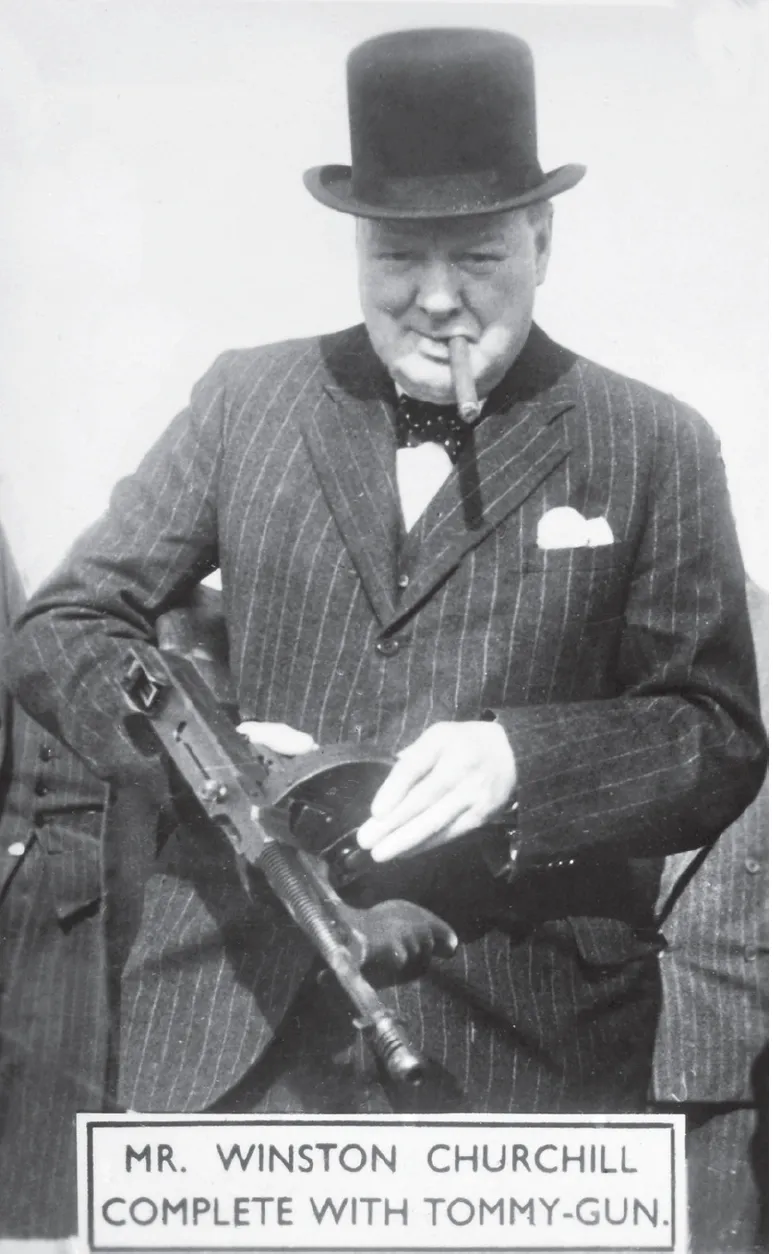![]()
SIR WINSTON CHURCHILL
Born: 30 November 1874
Died: 24 January 1965
Dates in Office: 10 May 1940 – 26 July 1945
26 October 1951 – 5 April 1955
Party: Conservative
Winston Churchill with Tommy-Gun, 1940. CN 11/6 (24)
Winston Churchill understood the value of a strong personal image, and how trademark features could help to project reassurance and positivity during difficult times, hence the homburg hat, the white spotted bow tie, and the cigar. Some of these features are present in this famous photograph of Churchill (wearing a tall bowler hat) with a Thompson submachine gun, which was used by the British to project him as a strong war leader, and by the Nazi regime to portray him as a gangster. And of course, we shouldn’t forget to mention the victory sign, which is so closely associated with him.
Churchill exhibits the Victory Sign, 1944. INF 1/244
As Chris Wrigley has written, ‘Churchill brought to 10 Downing Street his near-hyperactivity which, while it had some negative results was generally valuable in energising higher government’. His energy and dynamism is reflected in thousands of personal minutes and telegrams held by The National Archives, many of which are very hard-hitting and pithy, as in the Personal Minute shown below, in which he asks a series of staccato questions about the disastrous Dieppe Raid; but in some instances they also reflect Churchill’s sense of playfulness.
Churchill writes to General Ismay about the Dieppe Raid, 21 December 1942. PREM 3/256
Other documents demonstrate Churchill’s force of character in rather amusing ways.
Churchill on the subject of brevity in official documents in 1940. PREM 11/1734
Churchill certainly made significant mistakes during his long career in government, for example his role in the disastrous Dardanelles campaign of 1915-16, specifically the landings in Gallipoli. His role in the Bengal famine of 1943 has attracted considerable controversy. However, while awareness of his flaws is more widespread in modern times, he remains widely revered, and the consensus among historians is that his role in ruling out peace mediation with Germany in 1940 was crucial; and that he was effective and resolute as a war leader, rallying the nation with his superb oratory.
In the post-war years, Churchill warned of the threat to Western interests and values posed by the Soviet Union (see an extract from his ‘Iron Curtain’ speech on the following page); he also gave support to the cause of European unity.
He returned to power, at the age of seventy-six, in October 1951, and continued to concentrate mainly on foreign policy, pressing the US for an international summit with the Soviet Union (which did not materialise). Churchill’s health was in decline. He made a good recovery from a stroke in 1953, but in 1955 he finally retired, handing over to Anthony Eden.
Churchill remained a back bencher until 1964 – it is incredible to reflect that his Commons career had begun in 1900. Churchill died on 24 January 1965 at his London home, and he was given a state funeral.
Churchill’s ‘Iron Curtain’ speech, delivered in Fulton, Missouri on 5 March 1946. FO 371/51624
![]()
CLEMENT ATTLEE
Born: 3 January 1883
Died: 8 October 1967
Dates in Office: 26 July 1945 – 26 October 1951
Party: Labour
Clement Attlee circa 1945. INF 14/19
Mention Clement Attlee to any reasonably well-informed person with an interest in modern history and they are likely to quote one or two wittily crafted insults about him, both attributed (probably incorrectly) to Churchill: ‘He is a modest man, with much to be modest about’ and ‘An empty taxi arrived at 10 Downing Street, and when the door was opened, Mr Attlee got out’. These barbs have remained high in historical consciousness because Attlee was famously low-key and unassuming, at times almost comical with his conciseness. This was illustrated by his response to a BBC reporter who asked him if he wanted to make a comment about the campaign on the eve of the 1951 general election. Attlee simply replied, ‘No, thank you.’
Attlee’s response on this memo, written in blue pencil, ‘Yes, CRA [Clement Richard Attlee] 8.9.50’, is typically concise and indicates that he was a brisk dispenser of business. PREM 8/1486
Attlee was unlikely material for a socialist leader: the product of an upper-middle class home in Putney, promoted to Major during the First World War, he loved cricket and smoked a pipe. In many respects he appeared conventional and conservative, with a small ‘c’.
However, this portrayal does not give the full picture. He was, after all, leader of one of the most radical peacetime governments of the twentieth century, which transformed British society. Attlee was a formidable political operator, with passionately held convictions. From 1906 to 1909, he took on social work in the east end of London which brought him to socialism and the Labour Party.
Attlee’s role in the wartime coalition government, as Lord Privy Seal, and then Deputy Prime Minister to Churchill, is often overlooked. He was incredibly efficient in his chairing of meetings, and handling of paperwork, brisk and decisive, and this highly competent approach was to become a hallmark of his premiership.
Attlee’s Labour Party successfully caught the public mood in the general election of July 1945, promising ‘a land fit for heroes’. The result was a stunning landslide victory. The achievements of the Labour Governments of 1945-51 were remarkable, including the creation of the National Health Service and the establishment of the modern welfare state, with the introduction of extensive sickness and unemployment cover. Major sectors of industry were taken into public ownership, including the coal and steel industries, the electricity and gas supply, the railways, and the Bank of England. Foreign Secretary Ernest Bevin was a driving force behind the creation of the North Atlantic Treaty Organisation (NATO), the military alliance for the countries of the West created as a counterweight t...







